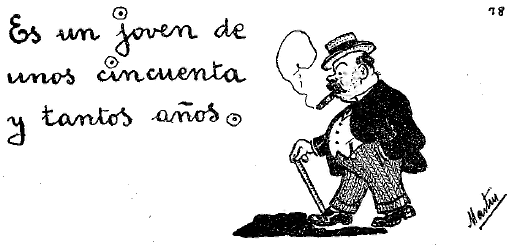
| Языки :: Испанский |
| Аудио |
 |
|
|
225 |
Español |
Spanish |
|
Lección Setenta y ocho (78) |
||
| León pide consejos (1) | Leo asks advice[s]. | |
| 1 |
(León es un joven de unos cincuenta y tantos años (2),
soltero y galante. Tiene un egoísmo tranquilo, nunca se ha preocupado para nada de los demás.) |
Leo is a youngster of about fifty and so many years, single and gallant.
He has a tranquil selfishness, and has never concerned himself in [for] anything with the others. |
| 2 |
Lleva un bigote gris, tiene las piernas cortas, el abdomen
abultado, botas de charol, chaleco blanco y sombrero de paja (3). León entra en el Circo a las diez de la noche.) |
He wears a grey moustache, has short legs, a pot-bellied abdomen,
patent-leather [varnished] boots, a white waistcoat and a straw hat. Leo enters the Circus at 10 p.m. |
| 3 |
León. — Yo necesitaría que alguien me indicara adonde debo ir, porque si no, estoy expuesto a aburrirme como el año pasado. |
Leo. — I should need somebody to [that somebody should : imperf. subj.] show me where I must go, because, if not, I am liable to be dull like last year. |
| 4 |
¡Luego estos médicos son tan estúpidos! Le digo a mi médico : — Yo estoy mal, doctor. |
And then those doctors are so stupid! I tell him, tell my doctor : — I am unwell, doctor. |
| 5 |
¿Qué le Pasa a usted? ¿No tiene usted apetito? — Sí, tengo apetito. — ¿No tiene usted sueño? — Sí, tengo sueño (4). — Entonces, ¿qué siente usted? |
What happens to you? You have no appetite? — Yes, I have appetite. — You don't sleep well [have not sleep] ? — Yes, I sleep well. — Then what do you feel? |
| 6 |
Hombre, yo no siento nada, pero me intranquilizo con facilidad,
me aburro por cualquier cosa y eso no puede ser sano. Yo debía (5) tomar unas aguas. |
Indeed, I feel nothing, but I fret readily, I feel dull for any motive
[thing] and this can't be healthy. I should take the waters. |
| 7 |
Pues vaya usted a Arrigorriaga, o a Caldeira, o a la
Carbonera... Y se marcha. ¡Estos médicos son tan egoístas! |
Well go to A, or C, or la C. And he goes away. Those doctors are so selfish! |
| 8 | (León ve a su amigo y va a sentarse a su lado.) | Leo sees [at] his friend and goes and sits [to s.] at his side. |
| 9 |
León. — Hola, Curro. ¡Buenas noches! Curro. — Hola, León. ¿Qué hay? (6). León. — Nada, aquí como siempre. Esto está muy desanimado. Curro. — Es que se ha ido ya todo el mundo. ¿Tú no te vas? |
Leo. — Good night, old Curro! — Curro. — This old Leo. What's the matter? — Leo. — Nothing, here, it's like always. It's very depressing. — Curro. — It's because [that] everybody has already left. Don't you leave? |
| 10 |
León. — Estoy vacilando, porque me encuentro malucho. Me han dicho que vaya a Arrigorriaga, que es hermoso. |
Leo.: — I hesitate, because I find myself seedy. They told me to go [that I go] to A., that it's beautiful. |
| 11 |
Curro. — ¿Hermoso? Es magnífico, chico. Allí se pasan los días sin notarlo. Toda gente de Madrid, te advierto. |
Curro. — Beautiful? It's splendid, my boy. The days fly [pass] without (one) noticing it. All Madrid people, I warn you. |
| 12 | El año pasado estuvo Lola Izquierdo y nos divertimos la mar (7). | Last year, Lola I. was there, and we had a great time. |
| (Sigue) | (To be continued.) |
| NOTES. | |
| 1 |
For a change we'll take for the text of 3 lessons an amusing light
comedy from Caballero Audaz. The notes, slightly longer, will replace the "Ejercicios". — Pedir, yo pido, Vd. pide. |
| 2 |
Tanto, like mucho, poco, etc. is variable. Notice how unos and tantos are used here : Tengo unas (or algunas) pesetas, I have a few p. — Tengo unas veintitantas pesetas, I have twenty and a few p. |
| 3 |
Bigote : pelo que nace sobre el labio (lip) superior. — Un bulto, a package (un paquete), or a bulge, hence abultado. — Las botas, boots or high boots; los zapatos, the shoes. — Sombrero hongo, bowler ("mushroom hat"); sombrero blando, a soft hat; sombrero de copa or de copa alta, a top hat ("of high cut"). — La boina, the beret La gorra, the cap. |
| 4 |
¿Tiene usted sueño? [Have you sleep?]
Are you sleepy? or, here : Do you sleep well? (¿Duerme
usted bién?). — Estoy mal, I am ill at ease. Estoy malo, I am ill. Soy malo, I am bad, wicked. |
| 5 |
I should is theoretically : yo debería; but this form
sounds affected and many people say : yo debía, which is properly
: I had to. — Con facilidad or fácilmente. — Tomar unas aguas or Tomar aguas. |
| 6 |
Hola, like English hello!, a familiar greeting. — Francisco, Francis, familiarly Paco and in Andalusia, Curro. |
| 7 |
La mar, a familiar phrase : heaps, lots of. Había la mar de gente, there were heaps of people. Mar is masculine (el mar Mediterráneo), except in a few, especially nautical, phrases. — Alta mar, the high sea(s). Le estoy la mar de agradecida, I am heaps grateful to him (or to you). |
